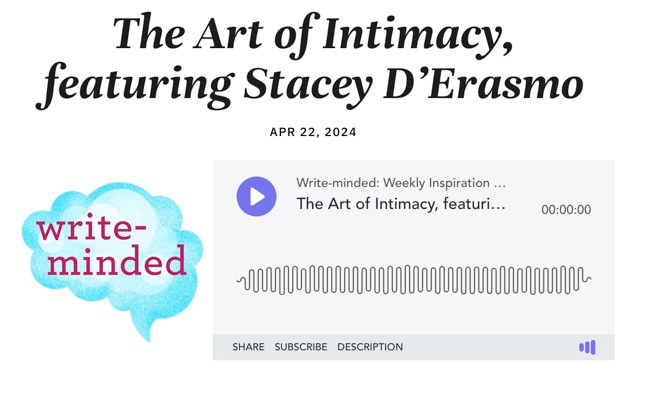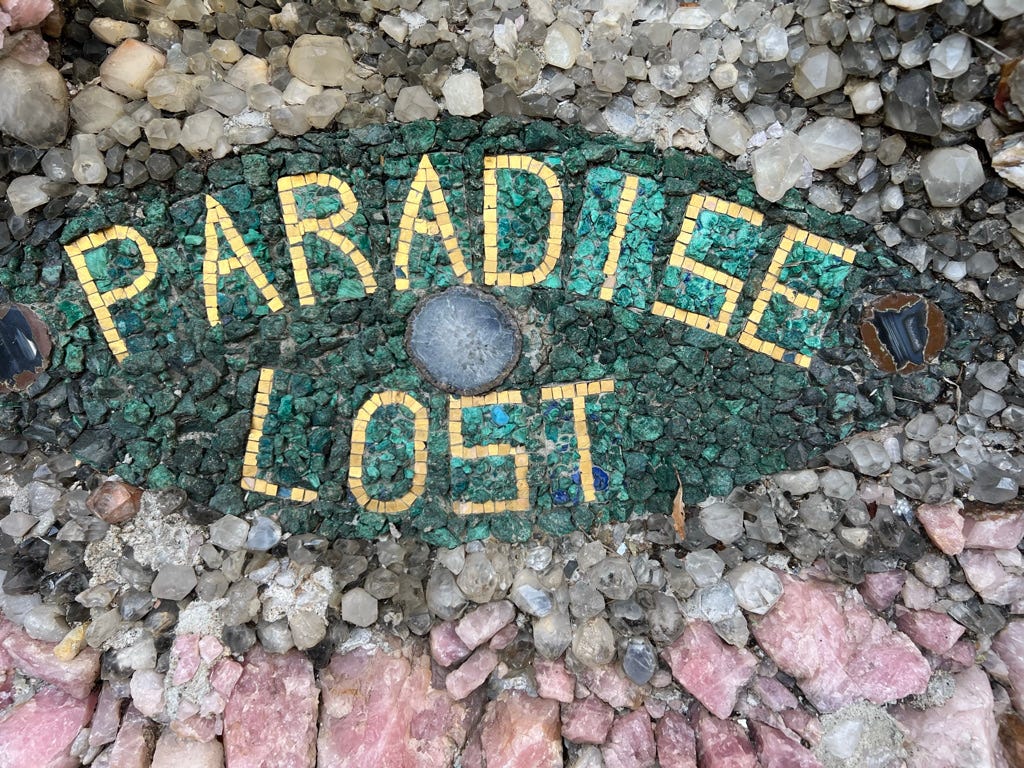Why "Intimations"? Why intimacy?
The name of this newsletter holds a philosophy
I’m sometimes asked about the name of this newsletter, especially the word intimations.
I remember the morning I decided to start a Substack newsletter. I just woke up and started one, blindly, without any forethought or planning.
But I was in a mood.
I was in a mood where all of the “author platform” and “personal branding” stuff of being a writer bugged me. I just wanted to write my truth and put it into the world. So when I was filling out all of the Substack fields for the newsletter and reached the section about what to name it, I decided to put in a name that spoke solely to me—marketing be damned!
I didn’t need it be “Just write!” or “Write on!” or “Write until your pants are on fire!” or any other bouncy, motivational slogan (all of which would have been better branding and would have led to more subscribers, etc.).
The word intimations speaks to the subtle, not the salesy. It means “an indication or hint,” “the action of making something known, especially in an indirect way.”
Increasingly, as I get older, I find myself in states of indeterminacy, shadowy states of uncertainty. I find myself piecing through different shadings of meaning, meanings that are elusive and shape-shifting and fundamentally mysterious.
Searching for the deepest intimacies
Intimation, like intimacy, comes from the Late Latin intimatus, meaning “inmost, intrinsic,” from “innermost, deepest.”
We live in a swirl of intimations. Hints from deep within. Some intimations are sweeping and powerful. Some are slippery. Others haunt, as if they are messages from the other side.
Intimations is the single word that best describes my aesthetic. I read and write (and live) primarily to feel intimacy. Not romantic intimacy necessarily, but the ache to connect. The yearning that slides into the “spaces in between,” as Stacey D’Erasmo defines intimacy.
Spaces. How do we get closer to another, to life? How do we get closer to ourselves?
There are hundreds, if not thousands of different kinds of intimacies. The intimacy of envy, the intimacy of empathy, the intimacy of anger, the intimacy of love. We try to get closer, yet we reside in the spaces.
The “benefit of being misunderstood”
In one of my classes, a student told me he had grown up with “the benefit of being misunderstood.” It occurred to me that this perfectly describes the state of a writer—our primary drive as humans is to be understood, be seen, and writers use words, these tools of precision and imprecision, to make ourselves understood, to make life understandable—to try rather, to endlessly try.
It’s a futile endeavor, of course. Intimacy is felt, so it is not always something we know how to put words around. Our words will only take us to the spaces in between. We never really truly know another. We never truly know ourselves. We exist in wafts of mystery, tracing the hints that are offered to us.
Take one of the most powerful statements of life: “I love you.”
“I love you,” he said.
“I love you,” she said.
There’s an inherent distance if not a chasm between the two statements. Each person is projecting a story full of expectations, hopes, requirements, needs, desires. The two statements could in fact be entirely at odds with each other. That is the irony. The proclamation “I love you” often doesn’t allow for more meaningful intimations to shine through.
I’ve always viewed the word love as a sacred word. I think it should be reserved for the most intense moments of feeling. Unfortunately, it’s become a word that is so overused, and used so lazily and perfunctorily, that I don’t entirely trust the word.
I think of Margaret Atwood’s statement: "All writers feel struck by the limitations of language. All serious writers."
I like to think of other words to express love. Not words from a thesaurus, but other groupings of words, other rhythms of intimations. Other expressions.
Or: how can love be expressed without words? The love that is shown is always more powerful than the love told.
I’m talking about love on the page and off the page.
To get intimate. To get close. To reach across the space between us. This is what writing is.
In one of my stories, one character chastises another for not saying “I love you” as often as he’d like. But in chastising his lover, he reveals the deficiencies of his own love, because his love holds more distrust for her love than acceptance for who she is and how she expresses it.
Love as demand isn’t love. Love as scorecard isn’t love.
Sit still and simply feel love. Then see what shapes, what language it takes in the world. See when it’s understood and misunderstood. Search for those limitations of language that Atwood mentions, and then see what depths of expression and intimacy you can unearth through your realization of limitations.
Limitations tend to be gifts if used appropriately. Limitations are pathways to intimations. Intimations might be uncomfortable, vulnerable places that require work to explore and translate and understand, yet intimations are the constellations we live in.
"Fiction, at its best, is a radical act of intimacy. It seeks to join, to merge, to know deeply; and, as with intimacy, there is a way in which it cannot be faked,” said Stacey D'Erasmo.
To get intimate. To get close. To reach across the space between us. This is what writing is. What life is.
E.M. Forster said, “Only connect.”
Night is night. We stumble in the darkness. Intimations provide my only light.
Because a paid subscription
Intimations is a labor of love, but it’s still very much a labor—one that’s made possible by paid subscribers.
By opting to pay just $5 per month, you’re saying that each issue gives you at least $1 worth of value. (I hope that’s true!)
"I supported your work because every newsletter is imbued with truth. Painful truths, beautiful truths, the kind of wisdom that points at the writer's unconscious and says, 'There, do you get it now?' in the kindly manner of a parent guiding their child."
—Cheryl Zhelyazkova
Because a quote
“What interests me are the complexities and contradictions and struggles and joys of messy human beings.”
—Stacey D'Erasmo
Because I’m available for book coaching and editing!
I’ve been a writer, editor, and publisher. I’ve also written extensively about creativity in numerous books and articles, talked with 300 writers on my podcast, Write-minded, led the largest writing event in the world, National Novel Writing Month, and …. well, I’ve just immersed myself in all things writing for a lifetime.
I bring this wisdom and more to my one-on-one work with writers.
Because a quote
“What interests me are the complexities and contradictions and struggles and joys of messy human beings.”
—Stacey D'Erasmo
Because Write-minded
Because this is where we live …
… and it’s paradise we seek to return to.






“We never truly know ourselves. We exist in wafts of mystery, tracing the hints that are offered to us.” Beautiful writing, Grant! I’m working on a memoir about a life time with some-one who is now fighting a tough cancer fight. So much of this newsletter speaks to what I am trying to capture- the fleetingness of life, yet the infinite time found in one moment of love. Thanks for this. I need to catch up on your podcast episodes!
Again, you've provided me with revealing dimensions of the infinitely faceted mind: to see my writing in some different way, exploring what reading does to both writer and reader; to understand more fully a new aspect of how writing is a life explorer's journey through the trees as the intimate way to know the forest.